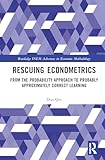Rescuing econometrics: from the probability approach to probably approximately correct learning
Series: Routledge INEM Advances in Economic MethodologyPublication details: Routledge London 2024Description: xii, 100 pISBN:- 9781032586052
- 330.015195 QIN
| Item type | Current library | Collection | Call number | Copy number | Status | Date due | Barcode | |
|---|---|---|---|---|---|---|---|---|
 Book
Book
|
Indian Institute of Management LRC General Stacks | Public Policy & General Management | 330.015195 QIN (Browse shelf(Opens below)) | 1 | Available | 007827 |
Browsing Indian Institute of Management LRC shelves, Shelving location: General Stacks, Collection: Public Policy & General Management Close shelf browser (Hides shelf browser)

|

|

|

|

|

|

|
||
| 330.015195 MIG Principles of econometrics: theory and applications | 330.015195 PED Econometrics for dummies | 330.015195 POR Introduction to mathematics for economics with R | 330.015195 QIN Rescuing econometrics: from the probability approach to probably approximately correct learning | 330.015195 SED Introductory econometrics: a practical approach | 330.015195 SED Introductory econometrics: a practical approach | 330.015195 SED Introductory econometrics: a practical approach |
Haavelmo’s 1944 monograph, The Probability Approach in Econometrics, is widely acclaimed as the manifesto of econometrics. This book challenges Haavelmo’s probability approach, shows how its use is delivering defective and inefficient results, and argues for a paradigm shift in econometrics towards a full embrace of machine learning, with its attendant benefits.
Machine learning has only come into existence over recent decades, whereas the universally accepted and current form of econometrics has developed over the past century. A comparison between the two is, however, striking. The practical achievements of machine learning significantly outshine those of econometrics, confirming the presence of widespread inefficiencies in current econometric research. The relative efficiency of machine learning is based on its theoretical foundation, and particularly on the notion of Probably Approximately Correct (PAC) learning. Careful examination reveals that PAC learning theory delivers the goals of applied economic modelling research far better than Haavelmo’s probability approach. Econometrics should therefore renounce its outdated foundation, and rebuild itself upon PAC learning theory so as to unleash its pent-up research potential. The book is catered for applied economists, econometricians, economists specialising in the history and methodology of economics, advanced students, philosophers of social sciences.
(https://www.routledge.com/Rescuing-Econometrics-From-the-Probability-Approach-to-Probably-Approximately-Correct-Learning/Qin/p/book/9781032586052)
There are no comments on this title.

